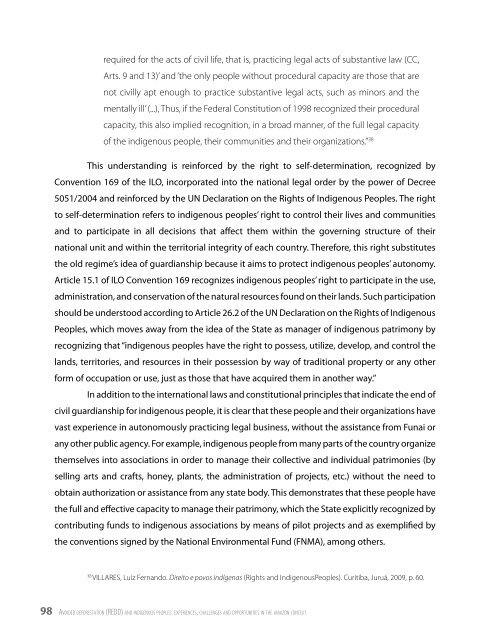Avoided Deforestation (REDD) and Indigenous ... - Amazon Fund
Avoided Deforestation (REDD) and Indigenous ... - Amazon Fund
Avoided Deforestation (REDD) and Indigenous ... - Amazon Fund
Create successful ePaper yourself
Turn your PDF publications into a flip-book with our unique Google optimized e-Paper software.
equired for the acts of civil life, that is, practicing legal acts of substantive law (CC,<br />
Arts. 9 <strong>and</strong> 13)’ <strong>and</strong> ‘the only people without procedural capacity are those that are<br />
not civilly apt enough to practice substantive legal acts, such as minors <strong>and</strong> the<br />
mentally ill’ (...), Thus, if the Federal Constitution of 1998 recognized their procedural<br />
capacity, this also implied recognition, in a broad manner, of the full legal capacity<br />
of the indigenous people, their communities <strong>and</strong> their organizations.” 38<br />
This underst<strong>and</strong>ing is reinforced by the right to self-determination, recognized by<br />
Convention 169 of the ILO, incorporated into the national legal order by the power of Decree<br />
5051/2004 <strong>and</strong> reinforced by the UN Declaration on the Rights of <strong>Indigenous</strong> Peoples. The right<br />
to self-determination refers to indigenous peoples’ right to control their lives <strong>and</strong> communities<br />
<strong>and</strong> to participate in all decisions that affect them within the governing structure of their<br />
national unit <strong>and</strong> within the territorial integrity of each country. Therefore, this right substitutes<br />
the old regime’s idea of guardianship because it aims to protect indigenous peoples’ autonomy.<br />
Article 15.1 of ILO Convention 169 recognizes indigenous peoples’ right to participate in the use,<br />
administration, <strong>and</strong> conservation of the natural resources found on their l<strong>and</strong>s. Such participation<br />
should be understood according to Article 26.2 of the UN Declaration on the Rights of <strong>Indigenous</strong><br />
Peoples, which moves away from the idea of the State as manager of indigenous patrimony by<br />
recognizing that “indigenous peoples have the right to possess, utilize, develop, <strong>and</strong> control the<br />
l<strong>and</strong>s, territories, <strong>and</strong> resources in their possession by way of traditional property or any other<br />
form of occupation or use, just as those that have acquired them in another way.”<br />
In addition to the international laws <strong>and</strong> constitutional principles that indicate the end of<br />
civil guardianship for indigenous people, it is clear that these people <strong>and</strong> their organizations have<br />
vast experience in autonomously practicing legal business, without the assistance from Funai or<br />
any other public agency. For example, indigenous people from many parts of the country organize<br />
themselves into associations in order to manage their collective <strong>and</strong> individual patrimonies (by<br />
selling arts <strong>and</strong> crafts, honey, plants, the administration of projects, etc.) without the need to<br />
obtain authorization or assistance from any state body. This demonstrates that these people have<br />
the full <strong>and</strong> effective capacity to manage their patrimony, which the State explicitly recognized by<br />
contributing funds to indigenous associations by means of pilot projects <strong>and</strong> as exemplified by<br />
the conventions signed by the National Environmental <strong>Fund</strong> (FNMA), among others.<br />
38 VILLARES, Luiz Fern<strong>and</strong>o. Direito e povos indígenas (Rights <strong>and</strong> <strong>Indigenous</strong>Peoples). Curitiba, Juruá, 2009, p. 60.<br />
98 Av o i d e d d e f o re s t A t i o n (redd) A n d i n d i g e n o u s p e o p l e s: experiences, chAllenges A n d o p p o r t u n i t i e s in t h e A m A zo n c o n t e x t
















